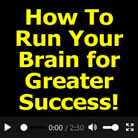Energize Your Life – Use Your Brain For A Change (Part 2)
Order and download this entire eight-part audio program.
(…continued from last week)
Why Don’t We Change
So if there’s pain why don’t people change? The reason is because they haven’t hit the emotional threshold for pain. There’s a place where it’s no longer tolerable. Where you say never again, I’m not doing this anymore. I’m done with it, I’m through, I’m finished, that’s it, I hit a wall.
For instance have you ever known someone who wanted to quit smoking? Well was it an easy process? For some it is, for most it’s not. Quitting smoking, no matter how much people harp on the person who is smoking, it is not an easy thing to do because until they decide they are going to do it for their own reasons it’s a difficult task. They don’t have enough pain or pleasure to stop the habit because there’s both a chemical and a psychological addiction to it.
What about someone who bites their fingernails? Have you ever known a fingernail biter? Hmm? Well, think about it. There is not enough pain of ugly fingernails or enough pleasure of having your fingernails look normal to stop them from doing it, so they nibble on their fingers.
What about someone who’s a poor public speaker but has to get up in front of people and talk? They’re only going to change those lousy speaking habits when they’ve been embarrassed, when it becomes very intense, when they see a payoff for doing it that’s better than just keep on doing it the same way. There has to be enough pain and pleasure so that they decide, “Okay, I’m gonna learn how to do this. I’m gonna take the time to figure it out and move forward.”
See, this boundary, this place where all of a sudden I must change now, is different levels of pain and pleasure. Boredom is a pain but so is your best friend’s dying; very different magnitude, very different levels of pain.
Watching TV is a pleasure but so is winning $100 million. There’s a difference in power, energy and magnitude of those pleasurable things. So we need to think about how big is this thing we’re going through. What is the difference in the experience?
We also get pain or pleasure from different things. A drive in the country may be great pleasure to the person driving or to your grandparents. Then again that drive in the country, depending on where you’re driving, may be very boring to you because you drive it day-in, day-out. And it may absolutely be painful to your 10-year-old who has to miss a party just to go on this stupid drive in the country.
A crucial lesson for each of us is to become very clear about what brings us pleasure and what brings us pain; and how to use them both, the carrot and the stick, to move ourselves and design what we deem to be a fulfilling life. It’s a matter of focus.
If you link pain to a behavior you no longer want to have, and pleasure to a behavior you do want, you will change because you changed your mental program. The drivers of pain and pleasure go to work for you and you then have the control you need to make your life different. Whether that is learning a new skill, changing a bad habit, strengthening your body; it doesn’t matter what it is—both pain and pleasure can assist your change process.
For instance, a number of years ago I had a client who was blowing his grades. It wasn’t that he couldn’t do it. It was just he wasn’t giving it the energy and so his grades were going downhill. He knew he needed to change. He even wanted to change. But he had gotten in this cycle, this habit, so he could just not get himself to take action. It became a habit that was deeply ingrained.
He had pain, because his parents were frustrated with him, his coach was giving him a hard time, friends were wondering what was up with him, his girlfriend was mad at him because of it.
We built a pain and pleasure model, basically, in John’s brain. We built vivid, clear, strong, three-dimensional, full color movies with sound that he could feel just like he was really there. Part of the movie was seeing the pain of his friends shunning him because they thought he was stupid for blowing his grades.
He also had a movie in there of his coaching saying, “Sorry, you’re benched. You can’t play baseball or football because of the fact that your grades are so lousy. You’re done.” He thought he might have a sports scholarship coming up. This would just kill him.
He saw his parents grounding him because he was not doing well. So he couldn’t date, he couldn’t go to dances, he couldn’t go to practices; he was stuck. He knew that he could see this college dream he had floating away into Never-Never Land because he wouldn’t be able to get into a good college if he didn’t pull his grades up.
But the biggie for him, one of the real pains was his girlfriend’s disappointment in him. He saw this look on her face of how disappointed she was in him and it just stabbed him in the heart.
On the other hand, we built a movie of pleasure. He saw himself feeling proud, holding that report card with these great grades. He felt good about it. He felt good about turning his assignments in on time, getting the homework done he needed to, giving great speeches. His coach liked it. He envisioned his coach congratulating him, patting him on the back saying, “You’re doing great, keep it up.”
He saw people that he admired; his parents, his aunts, his uncles, his good friends who were happy. And even more than all of that, he felt proud of the accomplishment. He felt less restriction. He felt more freedom because he was taking a chance and making it happen on his own.
What you link pain and pleasure to will shape your life. Have you ever known a druggie? That was all they lived for. Has the pleasure of getting the drug, of consuming the drug, of getting that high or low whichever it gave them, shaped their life in any way? Absolutely, no doubt about it.
On the other hand, have you known somebody who’s a really good athlete? Do you think the pleasure of that great performance, and the pain if they don’t give it their all, has shaped them? Without a doubt. It’s a driver, it moves us forward, it allows us to take chances, to give it a shot, to make things the way we want.
Most like to think they live their lives and determine their reality based on their thoughts and their logic. No. Really we base it on our emotions. When it comes to a battle between the willpower and the imagination, your imagination will win hands down every time. And your imagination is ruled by memories, by visualizations and by your emotions.
The motivational speaker Zig Ziglar a number of years ago said, “People justify their purchases with logic but they buy on emotion.” How true, how true. You know, we may talk ourselves into it but really it’s because of how it feels that we made the decision.
For instance, why do you drive the car or truck that you drive? Because it feels comfortable to you; it’s something that felt right to you. “Oh no, not me; I bought it because it’s logical, I need this truck for my work.” Uh-huh, right. Well, maybe you do use it for work but it felt like the right thing to do.
So you justify logically what you did on emotion. What about your clothes? The style of clothing you wear. Do you wear the same style of clothing as your 10-year-old children and you’re 45 years old? If you do you may want to check things out other alternatives.
But again it’s the pain or pleasure principle. You do what you do because you get an emotion that says this is the right thing. What about your hair style? Again, you have the hair the way you have it because of how you feel emotionally. It gives you something. Whether that is shaving your head, letting your hair grow down to your feet, or anywhere in between those two, you have the hairstyle you have because it feels like the right thing for you.
Why do you live where you do? You live there because it’s a comfortable place. The job you work, the friends you have, all the toys and goodies you’ve collected over the years, you have them all because they felt like the right things for you.
We justify our purchases with logic but we buy on emotions. And the emotions that we buy on are either avoiding pain or gaining pleasure by the things we’re doing.
(to be continued…)
Has this program caught your interest? Just can’t wait to hear the next segment? Or perhaps you’d like to download the entire program to your phone or tablet and listen during your travels? You can purchase and immediately receive this entire program as a digital download. You will receive all 8 audio segments, plus a 27 page PDF transcript! Order Now: Energize Your Life
Posted: April 1st, 2015 under Audio Programs.






